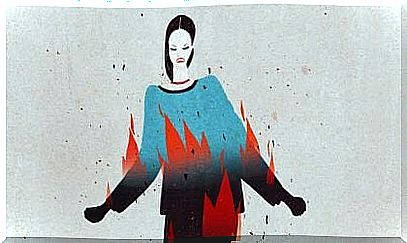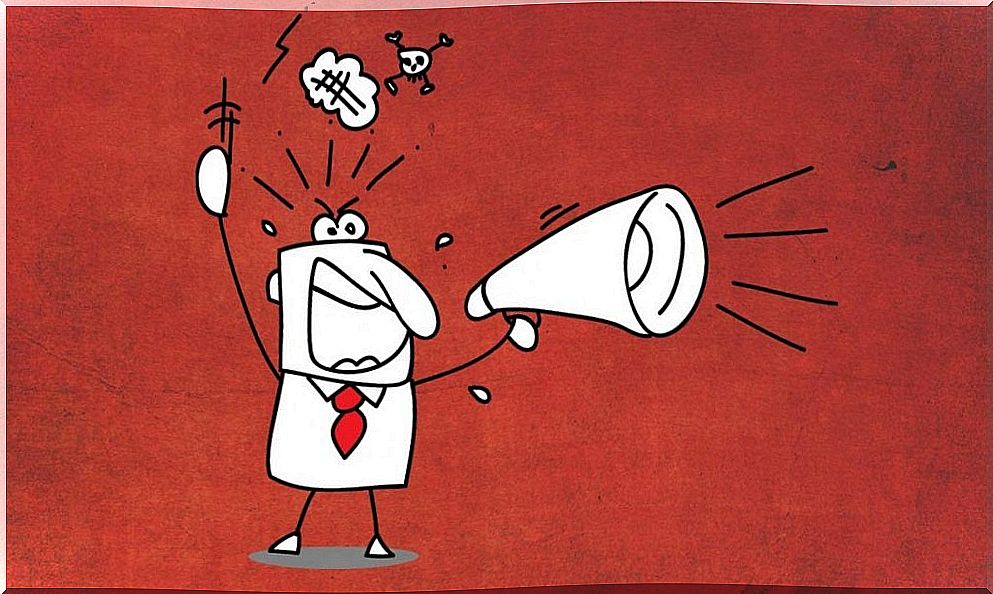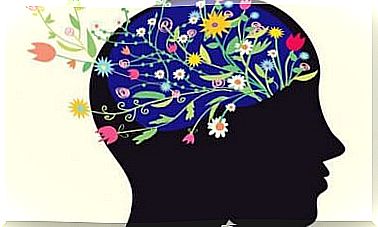Irracible People: Anger As A Form Of Communication

Irracible people are addicted to constant anger. Knocks on the table, doors slamming, screams and even tantrums… They are those profiles that do not know how to communicate without raising their voices, those that lose their posture and cannot be contradicted. So, behind this difficult behavior, there is often a weak being who uses anger as a defense mechanism.
We’ve all lost our cool at one time or another. We know what it is like when anger overtakes us and, almost without knowing how, we explode in the most inopportune and least skilful way. Now, what is most impressive about these experiences is that they offer us good lessons; we learn by force how important an assertive attitude is in dealing with the complicated situations in which our emotional maturity is put to the test.
On the other hand, there is a crucial aspect that is important to consider. Anger remains, today, an emotion little or not understood. We could say right now that irascible people are those presences worth avoiding in our daily lives to preserve balance and health.
However, nothing is more important than understanding. Let’s make good use of psychology and let us understand that behind that angry child, that family member with bitter treatment, and that boss without resistance to frustration, there is someone who doesn’t know how to use another type of language. Someone who deals with himself and doesn’t know what to do or where all this explosive anger and poisoned negativity comes from.

Irascible people: why do they act this way?
The French have a very good word for these passive-aggressive behaviors, for those people who use anger as their medium of communication. They use the expression “sous-entendu” which would mean something like “what is meant below or what is below”. What is there, then, under that wolf skin that makes use of such devastating emotional intensity? The answer couldn’t be simpler: there is another wolf, but it’s a wounded wolf.
Let’s look at some of these characteristics that could explain this kind of dynamic in irascible people.
- There is excessive anguish. People who react with anger tend to store a space overflowing with anguish. They are those profiles that since children were frightened by nothing, that when faced with any stimulus they reacted with intense fear and alarm. Thus, upon reaching maturity, this persistent restlessness with what is out of control or with the unexpected translates into anger. This emotion is nothing more than an excessive defense mechanism to react to everything and everyone.
- Anger as an answer to all negative emotions. This personality profile cannot recognize whether what he feels is sadness, disappointment, fear, restlessness, surprise or shame. All these emotions will be understood and translated in the same way: with anger.
- Anger is a cumulative problem. When there is an emotion that is not channeled, understood and managed, it accumulates. Furthermore, irascible people carry with them a history of frustrations stored up for decades. In this way, the most insignificant acts act as triggers for all that storm of anger contained in it.
- Anger and paranoia. This relationship is as problematic as it is remarkable. Irracible people are full of anguish, misunderstood convulsive emotions, and a noticeable residue of anger. All this deep architecture builds paranoid behaviors. Everything is a threat to them, they are suspicious, they think others are there to hurt them, to ridicule them. These are very exhausting situations.

How to learn to control anger?
Irascible people do not have a good quality of life. It is an aspect that, from a clinical point of view, cannot and should not be ignored. Furthermore, as several studies show, this personality type is more prone to suffer from heart problems, strokes, respiratory problems, low immunity… Anger sickens and, in addition, it sets insurmountable distances with the people we love.
So a common fact of this type of profile is that they apply what is known as displaced anger. They may be angry with something or someone, however, they end up projecting all their negative energy on those who least deserve it: children, partner… It is a priority to give resources and strategies to these people so that they understand that anger is not an adequate channel of communication, it is the assertiveness that will allow them to survive much better in any scenario.
Now let’s look at some simple strategies to reflect on that can help us manage this emotion much better.
- We must understand what anger is and what its purpose is. It is, in essence, a response that our brains make to attack or flee from a danger. It is a purely biological and physiological manifestation.
- The second step is to learn to identify your own emotions and understand what motivates them : What do I feel is sadness? What motivated this? If what I feel is shame, what caused it?
- Breathing Techniques. One way to channel the anger and rage that block our bodies and minds is to learn to relax, breathe, and focus on tense muscles and racing heart to calm them down. Only then will we allow ourselves to think better and react more appropriately.
- Replace anger with assertiveness. Another essential goal in irascible people is that they learn to relate assertively, they must shift the use of anger as a form of language to make assertive communication their best tool.

To conclude, we will point out just one last aspect. Sometimes, the irascible person not only makes use of verbal violence, but physical violence often becomes recurrent. Therefore, let us not hesitate to intervene in these cases, taking measures to protect us if we are victims of this profile, and action measures, if we are the ones who present these dynamics.









